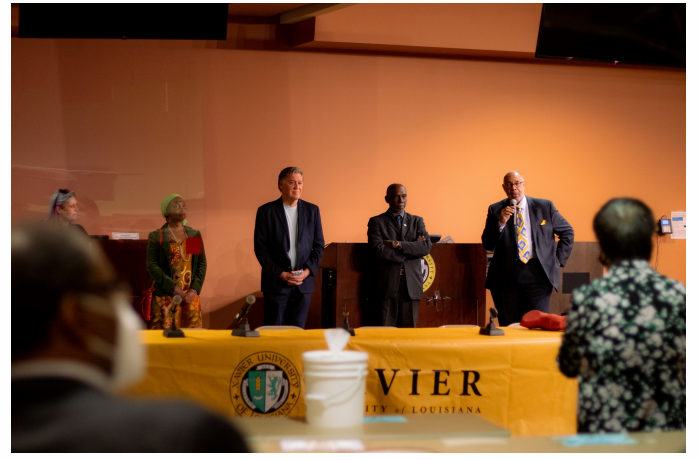By Jerin Minor
On November 3, 2021, Dillard University of Louisiana hosted ‘The Legacies of American Slavery and Food’; a conversation with Dr. Jesscia B. Harris, author, and Zella Palmer, director of the Dillard University’s Ray Charles Program in African American Material Culture. The two who discussed Harris’s published writings including her famous book, “High on the Hog.”
“She writes about African American food traditions in a way that contextualizes our struggles, and restores our ingenuity and creativity,” Palmer said.
Harris is a culinary historian, author of twelve books, and has various documentations of food and the foodways of the African Diaspora. Harris wrote extensively about the history of food and foodways of African Americans as it directly stems from African culture. Publications from this had been mainly from when she was traveling editor from the years 1977 to 1980.
Her most famous book, “High on the Hog”, published in 2011, connects to the four-part Netflix series of the same name. The docuseries focuses on the many ways to celebrate Black contributions to food and culture, worldwide.
“The title [High on the Hog] is an expression that comes from a deep African-American expression,” Harris said. Harris uses this phrase in the introduction of her book, in a tale within her book that depicts an enslaved master and his servant, John Humor. Humor manages to pull one over his master by securing a way to eat well without depending on his master. Humor, the nonfiction character, is used to self-depict how African Americans were still able to eat well even though their masters would only offer the unwanted parts of food.
Here is the tale of John Humor.
“Old master killed about 40 or 50 hogs each year. He had John help him when he was ready to pay him. He said, ‘John here’s your pig head and pigs feet and pigs ears,’ and John said ‘Thank you, boss.’ John had killed hogs for about five 5 years that way and that is what he got for his pay. John then had moved on to the back of the place and got himself three hogs. Old master didn’t know he had a hog. Next winter at the hog-killing time the old master went down after John. John comes to the door, ‘Yes sir.’ Old master starts to say ‘Be down to the house early in the morning, I want to kill hogs. Be there at about 5:30.’ John asks, ‘Old master, what are you paying?’ The old master responded, ‘I’ll pay like I always pay you. I pay the head, all the ears, and all the feet, and all the tails.’ John said ‘Well old master I can’t because I’m eating higher on the hog than that. Now I have three hogs of my own and I eat spare ribs and backbone and pork chops and middling ham and everything else. I eat high on the hog.”
“It comes from a desire to eat higher literally, on the hog, and not the pig’s feet but the ham,” Harris added.
During her four-decade-long career as a journalist, Harris has written multiple book reviews, and a variety of beauty articles. “The World Beauty Book,” another Harris work, published in 1995, explored a collection of beauty secrets from women of color around the world.
If you’re interested in music, food, memoirs, and travel then listen to Harris’s podcast, “My Welcome Table,” on iTunes.



